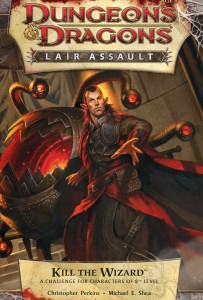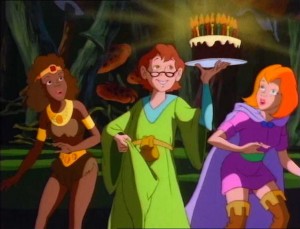 In this Lair Assault you’re are part of a special Drow “murder squad.” Your team must travel to the surface and kill a Wizard. It sounds straight-forward enough but failure will have devastating consequences. The Wizard has created a construct that he plans to mass produce and then set loose throughout the Underdark. These constructs have one purpose: kill all Drow. Your job is to Kill the Wizard, destroy the prototype, and ensure that no one can recreate it. Simple, right?
In this Lair Assault you’re are part of a special Drow “murder squad.” Your team must travel to the surface and kill a Wizard. It sounds straight-forward enough but failure will have devastating consequences. The Wizard has created a construct that he plans to mass produce and then set loose throughout the Underdark. These constructs have one purpose: kill all Drow. Your job is to Kill the Wizard, destroy the prototype, and ensure that no one can recreate it. Simple, right?
Lair Assault is part of Wizard of the Coast’s public play program. It’s intended to provide a whole new kind of D&D experience. There is very little role-playing in these adventures (by design). They are extremely combat heavy and reward smart play and clever tactics. It’s a power-gamers dream.
Knowing the kind of players these adventures attract, Wizards has made them exceptionally difficult. They fully expect that some or all of the PCs will die the first time they try any new Lair Assault. In fact they said at the outset that they estimate 80% of all groups will suffer a TPK in their first run-through. With the gauntlet thrown down you have to decide if you’re brave enough (or dumb enough) to accept the challenge and try to Kill the Wizard.
This is the fifth season of Lair Assault and the second that is part of the Rise of the Underdark theme running through all Wizards of the Coast product lines right now. One thing that makes this installment unique is that the players get to play the bad guys in this adventure. Not only that, but as Drow every player at the table should watch his back because you never know if another member of the squad is going to stab you in the back.
The new season of Lair Assault runs from September 1 – November 30. (I realize it already started, but I didn’t get the materials until last week and I’ve needed time to get this report put together.) Below I share some of the high-level details. I’ll try to keep it spoiler-free. Some of my suggestions and observations may seem a bit spoiler-y but most of my points are pretty obvious or fairly common sense things so I don’t think you have anything to worry about. I’m certainly not going to give away anything that will give players an unfair advantage.


